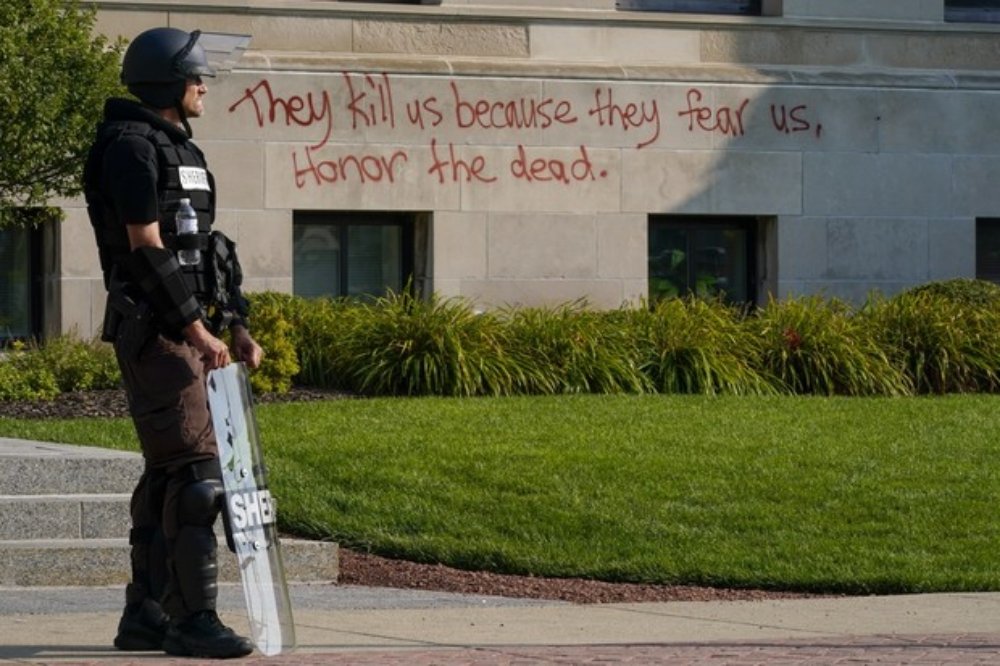On August 23, 2020, police shot Jacob Blake four times in the back in Kenosha, Wisconsin - and within hours, the streets were filled with protesters.
The next morning the National Guard came and within the next week around 40 buildings were destroyed. Two people were then killed by a protester before order was restored.
The events of that week saw many of the tactics used by the authorities in response to the protests but have only just begun to surface.
A series of six warrants (1 2 3 4 5 6), (some of which had been reported by Forbes), show that its location services Google were heavily used to trace Android users in the arson incidents.
Authorities targeted seven different geographical areas, seeking to identify anyone within those areas for periods of up to two hours.
Searching for location data for users in a specific area - called a geofence warrant - is a controversial practice that has spread in recent years.
In one incident in 2020, the data showed a cyclist as a suspect in the burglary of a house because he often passed by. Of course the technique is controversial, but it is particularly troubling when used in a mass protest, which inevitably scans innocent civilians along with suspected arsonists.
Jennifer Lynch, Street Level Surveillance project manager from Electronic Frontier Foundation, reports that the fact that police were able to get six warrants with minimal questions from the courts shows how dangerous geofencing warrants can be.
"We know there were hundreds if not thousands of people in the area who took part in legal protests," Lynch said. "It is unconstitutional. "There should not have been such warrants supporting an investigation involving so many people."
As regards privacy advocates, warrants do not recognize the risk of accidental data collection.
"When you have an investigation that necessarily involves gathering information about the protests," says Brett Kaufman, an attorney at the Speech, Privacy, and Technology Project of American Civil Liberty Union, “there should be protection to limit the collection of personal data by the Authorities and to allow the recording of disasters. Otherwise, you're just giving the government a blank slate."
The six warrants issued after the Kenosha protests differ significantly. The more specific request is based on a video and an eyewitness account of an arson attempt at bank TCF, southwest of downtown. This evidence allowed police to narrow down the time to 22 minutes, when someone broke the window and threw a Molotov cocktail.
The other warrants are very general, without direct witnesses, the police set up a two-hour and a barricade that covered most of the city center. This is a significant time, the busiest night of protest, in an area that was a natural meeting place for anyone who took to the streets that night.
It is worth noting that this is not the first time the technique has been used by the police. In May 2020, Minneapolis police used a similar technique to investigate the vandalism of a store during demonstrations sparked by the assassination of George Floyd.
Although many devices collect location data, Google has become the Authority's favorite target for geolocation warrants because of the company's data retention policy. IOS stores location data in a more anonymous and ephemeral way, which makes them less accessible to court decisions.
Google does not adopt something similar on Android because of the value of targeted ad data.
Let's talk now about the accuracy that it offers system:
The last pages of the warrants show that a specific procedure was applied by Google in an effort to address the privacy risks of the system.
In this context, Google first provides a set of location points, identified by time stamps and unique identifiers but without further identifiable information.
So once the authorities have this list in their hands, they can at their discretion identify "a subset of devices", and not a single device, that of the suspect, as stated in the warrant.





